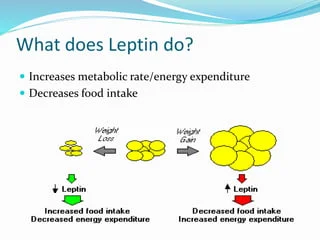Obesity, a global crescendo of health concerns, casts a long shadow on well-being, impacting millions worldwide. While genetics and lifestyle undeniably play their roles, understanding the internal conductor influencing fat breakdown and weight management is key to composing a triumphant symphony of success in combatting this complex condition. This maestro, the aptly named hormone leptin, holds the baton in regulating fat storage and orchestrating a healthy metabolic equilibrium.

The Satiety Signal Maestro
Imagine a bustling marketplace pulsating with vibrant activity. Vendors, representing fat cells, produce a signal (leptin) proportional to their abundance. This signal travels to the brain’s control center (hypothalamus), the central intelligence agency of appetite and metabolism. As fat stores expand, leptin production rises, sending a “stop eating” message to curb hunger and promote fat breakdown. This negative feedback loop ideally maintains a harmonious balance, preventing excessive fat accumulation and fostering a thriving metabolic orchestra.
The Detuned Orchestra
However, in obesity, this harmonious melody becomes jarringly discordant. Chronic overeating and fat accumulation can lead to leptin resistance, a condition where the brain becomes desensitized to its satiety signals. Despite high leptin levels, the hypothalamus fails to register the “stop eating” message, leading to persistent hunger and continued fat storage. This metabolic discord amplifies the obesity cycle, making weight management an uphill battle, akin to trying to lead a disharmonious orchestra to a triumphant performance.
Unmasking the Culprits: Factors Dampening Leptin’s Baton
Several factors can contribute to the detuning of leptin’s orchestra:
- Chronic inflammation: A constant low-grade fire simmering within the body, often associated with obesity, can impair leptin signaling pathways in the brain, further decreasing its effectiveness. Think of it as smoke muffling the conductor’s instructions, hindering the orchestra’s ability to respond precisely.
- Stress: The fight-or-flight hormone cortisol acts as a disruptive audience member, antagonizing leptin’s action by promoting fat storage and hindering its satiety signaling. Imagine it drowning out the orchestra’s key notes, creating confusion and impeding the performance.
- Sleep deprivation: When the body doesn’t get enough rest, it disrupts the delicate balance of hormones like leptin and ghrelin (hunger hormone), leading to increased appetite and decreased fat breakdown. Imagine the musicians losing their rhythm due to fatigue, causing the performance to lose its flow and clarity.
- Gut microbiome imbalance: The trillions of tiny inhabitants in our gut play a crucial role in nutrient absorption and metabolism. An imbalanced gut microbiome can hinder leptin production and sensitivity, contributing to weight gain. Think of it as a disorganized backstage crew hindering the flow of the performance, disrupting the overall execution.
Restoring the Harmony: Strategies to Re-sensitize Leptin
The good news is that the leptin orchestra can be re-tuned with targeted strategies. Its much like a skilled conductor restoring order and harmony to a chaotic performance:
- Adopting a healthy diet: Prioritizing whole foods, fruits, vegetables, and lean protein while limiting processed foods and sugary drinks can reduce inflammation and improve leptin sensitivity. Think of it as providing the orchestra with healthy sheet music, guiding them towards a more balanced and effective performance.
- Managing stress: Incorporating stress-reduction techniques like yoga, meditation, or deep breathing can help dampen cortisol levels and restore leptin’s signaling power. Imagine it as calming the audience, allowing the music to be heard clearly and enabling the orchestra to perform freely.
- Prioritizing sleep: Aiming for 7-8 hours of quality sleep helps regulate hormones like leptin and ghrelin, promoting healthy appetite and metabolism. Give the orchestra a chance to rest and recharge, rejuvenating their energy and focus for a stronger performance.
- Nurturing a balanced gut microbiome: Probiotics and prebiotics can support a healthy gut flora, potentially improving leptin production and sensitivity. Think of it as inviting skilled musicians to join the ensemble, enhancing the overall depth and richness of the performance.
- Regular exercise: Physical activity boosts metabolism, increases leptin production, and improves its signaling, making it a potent weapon against obesity. Picture the orchestra playing a fast-paced, energetic tune, burning more fuel and creating a dynamic and impactful performance.
Beyond Satiety: Leptin’s Multifaceted Symphony
Leptin’s influence extends far beyond its role as a satiety signal, enriching the metabolic symphony with additional layers of harmony:
- Energy expenditure: Leptin stimulates thermogenesis, the process of burning calories to produce heat. A well-tuned leptin orchestra translates to a more efficient metabolism, leading to higher calorie expenditure throughout the day.
Unraveling the Impact of Chronic Stress.
Introduction In the high-pressure environment of modern workplaces, chronic stress has emerged as a silent adversary, subtly undermining employee health.
Read MoreDopamine: Short-Term Rewards vs. Long-Term Corporate.
In the corporate world, there exists a critical challenge often termed as the “Dopamine Dilemma.” This concept revolves around the.
Read More